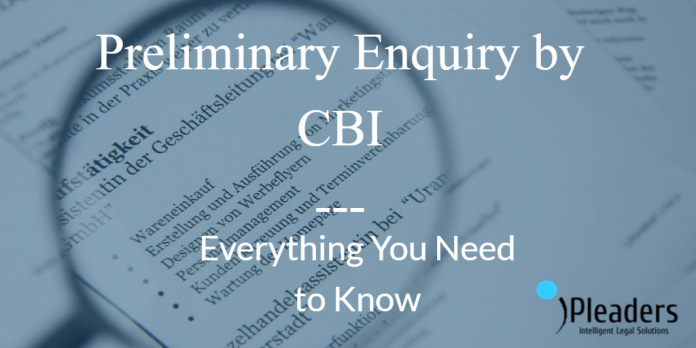This article on Preliminary Enquiry by CBI is written by Varun Chopra, a student of National University of Advanced Legal Studies, Kochi.
In the cases where the information and the complaints received by the CBI in relation to a particular case is such that there is enough evidence to show misconduct of the public servants but, not enough to justify the registration of a case under Section 154 of the Code of Criminal Procedure, a preliminary enquiry is usually initiated.
Conditions To File A Preliminary Enquiry
Such preliminary enquiries can only be initiated with the consent and orders of the competent authorities. Even in cases which have to be investigated as per the orders of the Supreme Court and the High Courts, if a preliminary enquiry is to be initiated, the same can only be done after receiving the consent and orders of the head office.
In a case where the commission of a cognizable offence is apparent according to the complaint or the information provided to the CBI, a preliminary enquiry cannot be registered.
Therefore, it is necessary that the Superintendent of Police must carefully analyse the material available at the time of evaluating the verification report submitted by the Verifying Officer so that the registration of a preliminary enquiry is not resorted to in situations where Regular Cases can be filed under Section 154 of the CrPC.
When the verification of a complaint as well as source information reveals the fact that a cognizable offence has indeed been committed, a preliminary enquiry can be changed into a regular case as is enjoined by the law. In certain cases, like when a case regarding the unnatural death of a person is referred to the CBI for enquiry, a preliminary enquiry is to be setup to ensure that the cause of death is ascertained and to decide whether there is enough evidence for the filing of a regular case.
Whenever there are requests from other branches to include a part of enquiry in their Preliminary Enquiry within the local limits of the branch concerned, the complaints should be entered by the latter branch. However, the procedure for the same is a little different. These cases are to be recorded in a separate crime register of Personal Enquiry and given a serial number for reference. The SP receiving such request may get the part- enquiry done at the earliest and forward the report to the concerned SP as early as possible.
Registration Of A Preliminary Enquiry
There are various important things that are to be kept in mind while registering a preliminary enquiry pertaining to the abuse of official position by a public servant.
For instance, in the case of abuse of official powers in the matter of business or commercial decisions, one matter that needs to be reviewed very carefully before initiating a preliminary enquiry is the difference between a legitimate business risk and malafide intentions.
This ensures that decisions are taken in good faith by the officials.
Hence, the decisions that are a bit risky will not be investigated by the CBI as it’s the legitimate business risk but, any mala-fide intention that is shown in a business decision, taken by an official, will be investigated and prosecuted as a corrupt act.
The registration of a Preliminary Enquiry against a retired Civil Servant should be resorted to very rarely. Section 9(2)(b) of the Central Civil Service Pension Rules, 1972, the Departmental proceedings, if not instituted while the Government Servant, when the said servant was in service, the same can not be instituted, whether before his retirement or during his re-employment, such a suit can not be instituted, in respect of any event, which took place more than 4 years before him/her leaving such institution.
If such proceedings are to be instituted, it can only be done with the consent of the president of India. Therefore, the decision to register a PE against retired Government Servants should be taken at a senior level and after careful examination of all the facts in the light of the provisions detailed above.
In cases where it becomes clear that soon after the enquiries are started, nothing useful is likely to come out or that the case is really fit for a departmental probe only. No time should be wasted over such cases and the Preliminary Enquiries should be recommended for the closure or for departmental probe, as may be appropriate, as early as possible.
Creating A PE Registration Report
As soon as it is decided to register a preliminary enquiry, the Superintendent of Police report prepared, which has to be vetted by him in any case. In certain cases, where the enquiry regards a situation of critical importance, the enquiry can even be drafted by the Superintendent of Police.
Registration Report of PE should be written in the PE Registration Report Form and not on the form prescribed for recording First Information Report under Section 154 Cr.P.C..
A registration report should contain the allegations levied in the complaint, along with all important details about the suspects involved in the case.
If the case involves the public servants, the registration report should include:
- Their Group
- The Service they worked for
- Present designation
- Scale of pay
- Present pay
- Date of superannuation (if available)
In those cases where the names of more than one suspect is involved in the complaint, extreme care should be taken while drafting a Preliminary Enquiry report.
- Only those suspects should be named in the Preliminary Enquiry Registration Report to whom overt acts have been attributed to.
- Officers of the rank of SP and above should, therefore, thoroughly scrutinize every draft PE Registration Report from this point of view and satisfy themselves, that persons against whom no prima facie evidence is available are not named in the PE Registration Report.
- A serial number of the branch shall be allotted to each Preliminary Enquiry Registration Report in the format prescribed in CRIMES module.
- The relevant details will be entered in the CRIMES module immediately thereafter.
- Wherever the CRIMES Module is not operational, the same may be entered in the Crime Register of PE.
- Developments in each PE will be noted in the CRIMES Module or the relevant columns of the register from time to time.
Collection Of Evidence
The preliminary Enquiry into the complaints that have been vetted should be done in a quick and efficient manner.
- The enquiries related to allegations of corruption should be restricted to the scrutiny of records.
- The interrogation of persons should be done in a way that it provides enough information in less time.
- To ensure all the substances in the complaint have been enquired .
- To decide whether the case is worth pursuing or not.
- The documents and records so collected should be done in lieu of a proper receipt memo.
- The statements being made by the witnesses under the course of investigation under the Preliminary Enquiry should be recorded in the same manner as it is done in the case of the investigation under the Regular Cases.
However, issuance of notices under sections 91 and 160 of the Code of Criminal Procedures.
Conclusion Of Preliminary Enquiries
In Case Of The PEs Against The NGOs in which “Suitable Action” by the concerned Department is recommended-
- The documents collected from the Department- to which the suspect public servant belongs – can be sent to the CVO of the concerned Department, along with the SP’s Report- with a detailed list.
- If some documents have been collected from other departments Or private persons/firms etc., they need not to be sent to the CVO along with the SP’s Report their certified copies would suffice instead .
- After the SP’s Report is despatched to the CVO of the concerned Department, the Branch SP should write a D.O. Letter to the CVO asking him to let him know specifically- within a period of two months from the date of receipt of the SP’s Report- whether he requires any of the documents collected from other departments, private persons/firms or whether those may be returned to the departments/parties from which these were collected.
- If the SP receives any request from the CVO, he may examine the same in the interest of the case and act accordingly.
In PEs Against The Gazetted Officers in which only “Suitable Action” is recommended-
- All the documents can be kept in the Branch Malkhana till the advice of the CVC is received by the department and their final decision is known.
- If the CVC also agrees with the CBI recommendation for “Suitable Action”, the documents can be sent to the CVO in the aforementioned manner.
In cases in which the CVO desires to see the documents collected from other departments or parties before deciding the nature of administrative action, they can be shown or sent to him with a detailed list.
Completion Of Preliminary Enquiry
The process of the preliminary Enquiry must be finished within 3 months of the initiation of the enquiry. Hence, the respective DIsGs are supposed to monitor all the Preliminary Enquiries which are been pending for more than three months.
At the conclusion of enquiry in every PE, the Investigating Officer will prepare an Enquiry Conclusion Report in the prescribed form and submit it to the Superintendent of Police.
The SP will pass final orders in respect of PEs, involving non-gazetted public servants and Non-Commissioned Officers.
In appropriate cases, the SP may dispense with preparation of FR-II by the Law Officers. He shall seek orders from the Regional DIG/Zonal JD/Head Office, as the case may be, in respect of the cases of other categories by forwarding Enquiry Reports along with his comments. Final Report in the prescribed form need not be prepared when a PE is converted into RC.
This’s all about Preliminary Enquiry by CBI for now. Did you find this post useful? Let us know in the comments section. Don’t forget to Share!
 Serato DJ Crack 2025Serato DJ PRO Crack
Serato DJ Crack 2025Serato DJ PRO Crack










 Allow notifications
Allow notifications


